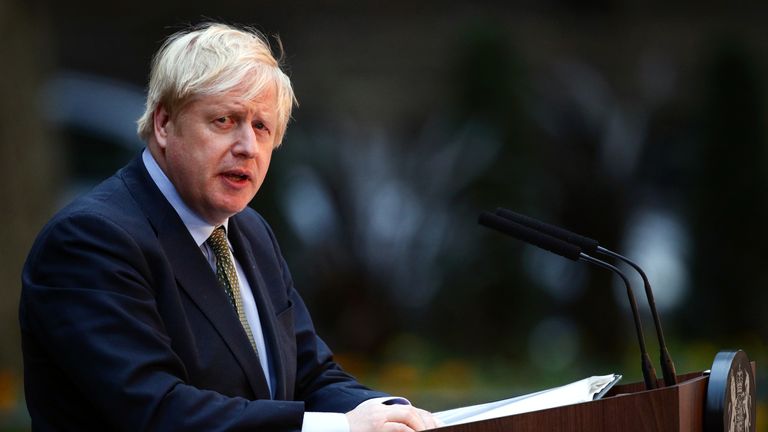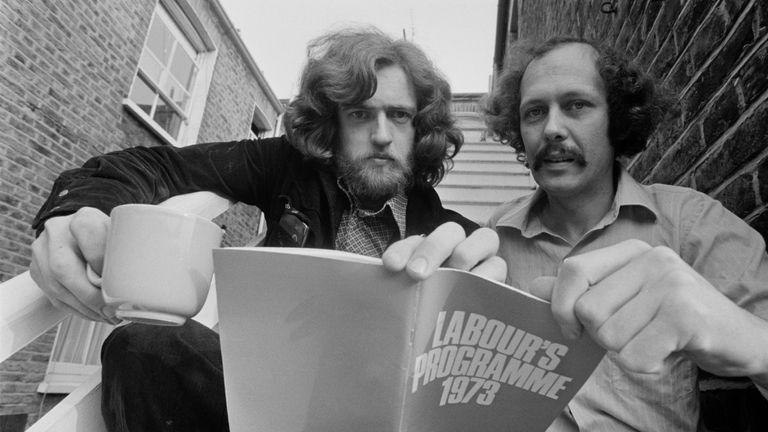Political editor @BethRigby
Boris Johnson's election victory is as seismic as Margaret Thatcher's election in 1979.
Hers was the first of three wins at the polls, which she used to reshape modern Britain as the country's first female prime minister, championed free markets and rolled back the welfare state.
And now Mr Johnson has won the opportunity to do the same. He has won with a monumental landslide of 80 seats.
He has redrawn the electoral map as the so-called "red wall" across Labour's traditional heartlands seats collapsed, bulldozed by Brexit.
Bishop Auckland, Bolsover, Newcastle-under-Lyme, Workington, Wrexham, Leigh, Clywd South, Sedgefield - all gone.
It has given him real power to enact real change in Britain.
With this sort of parliamentary firepower, he has the scope to radically realign the relationship between the government and the courts and clip the power of the judiciary - there was a nod to this prospect in the manifesto; or take the UK out of the EU without a Brexit deal if he sees fit at the end of 2020.

He has the parliamentary base to push through more taxes or more public spending and radically alter the laws by which we live.
It is a huge break from the past decade in which the three previous elections have delivered a coalition government, a narrow majority and a minority government in that order.
Each variant required compromise, constraint and a level of parliamentary accountability.
Now we are moving into a very different era where the prime minister has a very powerful mandate from the people.
After three elections and one referendum in four years, the public are tired of politics and tired of gridlock. They have given Mr Johnson a big majority in order, perhaps, to be left alone.
The scale of his victory is reflected in Labour's defeat.
Jeremy Corbyn's haul of 203 seats is the worst performance of any Labour party since 1935 and the challenge it leaves the party with is greater than anything it has faced in its history. The next leader must achieve more than Tony Blair did in 1997 to return to power.
The party must not only win back places like Bolsover, it must also invade traditional Conservative areas like Bournemouth and rebuild in Scotland to have any hope of winning an election.

This isn't just an election win for Mr Johnson, it is a result that could lock Labour out of power for another decade.
But Mr Johnson still faces major challenges. He has just one year to turn his slogan "Get Brexit Done" into reality.
He also has to find a way to knit together his traditional Tory voters in the shires of England with his new supporters in industrial towns who've voted Labour for generations.
He has spoken often of his "One Nation" values in speeches, in a nod to his desire to bridge the divide between the wealthy elites and the less well-off as prime minister.
Now he has to put that programme into action, starting off with the issues that concern his newest supporters - the NHS, the cost of living, austerity.
But perhaps his biggest challenge will be not just reshaping the United Kingdom but holding it together. This election has managed to resolve Brexit, but now the Union is in play.
This election showed the forces of nationalism are on the march around the UK, as the SNP won 48 out of the 59 seats in Scotland.
In Northern Ireland, nationalist MPs outnumbered unionist MPs for the first time in the nation's history. This a defining moment, the drumbeat for independence is growing.
There is no doubt that Mr Johnson's emphatic victory now gives him the opportunity to become one of the most impactful prime ministers of the modern era, alongside Margaret Thatcher and Tony Blair.
But the tensions between his government in Westminster, Holyrood, and potentially Stormont too, are a reminder that there remain forces in British politics out of his control.

